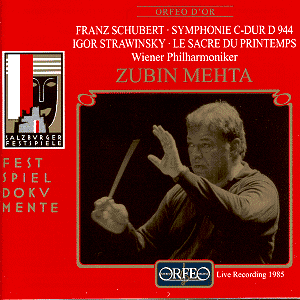Schubert's ‘Great’ Symphony is true VPO territory,
and to catch them live in Salzburg in this piece is a treat indeed.
Not that Zubin Mehta is known for his Schubertian credentials, so it
is doubly pleasurable to be able to enjoy this generally naturally-paced
reading which reveals a decidedly dramatic Ninth. The opening Andante
introduction flows nicely. The tempo for the ensuing Allegro ma non
troppo is well chosen, and Mehta makes much of the drama (more than
most, it has to be said) to ensure cohesion.
The oboe solo which begins the Andante con moto is
beautifully pointed, although overall this movement does seem a little
hard-pressed, and the strings are liable to chug away with their accompaniment
rather than imbue it with Schubertian bounce. The climax of the movement
can only be described as vehement, not a usual description for this
music. It certainly makes for compulsive listening, although despite
the validity of its viewpoint this is not a performance I would like
to hear every day.
It is not necessarily that the third movement is under
tempo, rather it needs to be more rhythmically sprung than this. The
VPO is capable of injecting more air into the score than this; there
is more drama to be had, too. The trio, in contrast, is too slow
and drags its feet shamefully. If one starts off far too slow, ritardandi
which lead in to structurally important recurrences of themes will of
necessity sound as if the orchestra (or your CD player) is running out
of juice. The finale has brio and (almost theatrical) drama about it
and is without doubt the most successful of the four movements. The
recording is a good radio recording and reveals a lot of detail within
a believable acoustic.
There is no way, however, that this reading can contend
with the competition it faces as a serious contender if it is to be
one's one and only version. Günter Wand's interpretations are an
interpretative league apart (RCA have just reissued his Cologne performance
on 74321 84607-2).
The Rite of Spring , in contrast, does not really
count as core repertoire for the Viennese, and there are some passages
in this performance (especially early on) which can only be described
as careful. Other passages, especially from the strings, are jaw-droppingly
accurate (are these the ones they rehearsed?). Whatever its failings,
as an interpretation, this is an interesting reading. It would appear
that Mehta's agenda is to bring a sense of the dance back in to this
piece (after all, it is so often heard as a barbaric orchestral showpiece
that its raison d'être can be obscured) and it is for this
that his account is praiseworthy. He is not afraid to present the layering
techniques Stravinsky employs barely, and that is also to his credit.
On occasion, he inspires the VPO’s strings to miracles of articulation,
but all this is not enough without a clear overall picture of the piece
and a full realisation of the power it contains: not really to shock
(not these days, anyway) but more accurately to appeal to our baser
instincts.
The apotheosis, the ‘Ritual Dance’, is the most violent
part of the performance. Is there a sense of desperation from the Viennese
string players here which brought this about? Certainly, while the work
ends well, it does not end barnstormingly because the accumulation of
rhythmic tension is not enough. Gergiev’s amazing new version on Philips
(468 035-2, coupled with a positively erotic account Scriabin’s Poème
de l’extase) will show you how its done.
Colin Clarke

 Vienna Philharmonic
Orchestra/Zubin Mehta.
Vienna Philharmonic
Orchestra/Zubin Mehta.